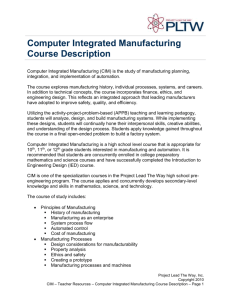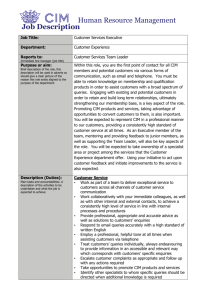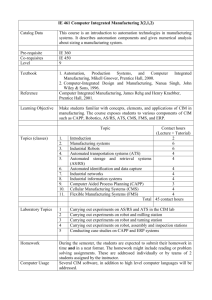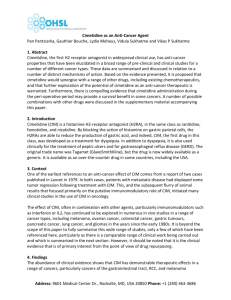Comparing Online vs In Class programs for divorcing parents
advertisement
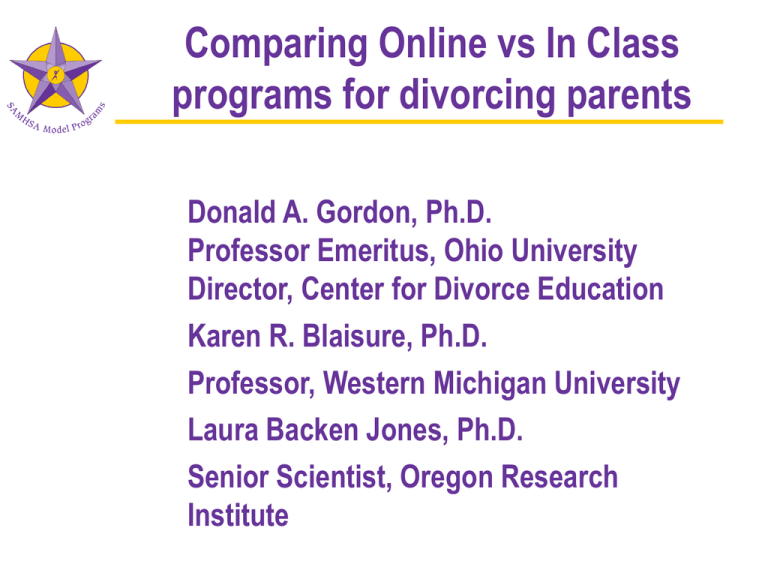
Comparing Online vs In Class programs for divorcing parents Donald A. Gordon, Ph.D. Professor Emeritus, Ohio University Director, Center for Divorce Education Karen R. Blaisure, Ph.D. Professor, Western Michigan University Laura Backen Jones, Ph.D. Senior Scientist, Oregon Research Institute Children In The Middle (CIM) (Overview & Brief History) The Developer 's background 30 Years, Clinical Psychologist Delinquency prevention and treatment Ohio University & Colleagues Research Shift – work w/divorcing families as way to reduce or prevent delinquency. Children In The Middle Continued Developing Divorce Education Starting from what we know: Divorcing Parents + High Conflict = Ability to parent well reduced Child(ren) + loss of 1 parent from home Child(ren) more likely to Act out and be Maladjusted = What Previous Research Shows Parenting Deficits During Divorce: Attention to child and support declines Discipline becomes inconsistent Supervision of child declines Disruptions in communication What can be done to contain the conflict, promote productive co-parenting skills, and reduce harm and hurt to children? CIM Program Development – Research Shift: Review of the Literature – Building on Past Evidence Structure of Existing Parent Education Programs Length variation: 2-14 hours in one to seven session(s). 3 Models of delivery • Information/Lecture Based = Provides information only (most prevalent) • Affect Arousal = Elicits strong emotions, feel bad, heightens awareness. • Skills Based = Learner Centered, engagement w/curriculum, tools + skills learned Children In The Middle -- Program Development Review of the Literature – What research says: Which Model of Delivery Changes Behavior? Information/Lecture & Affect Arousal o Parent satisfaction, while easily attained, is not related to behavior change o No evidence this approach works Skills Based = direct link to behavior change. Children In The Middle -- Program Development: Review of the Literature – What research says (Continued) Critical Skills to Teach in Divorced PE: Minimizing children’s exposure to conflict Controlling parental anger Sensitivity and empathy Support for other parent’s relationship with child(ren) Supervision, involvement with child Discipline Children In The Middle -- Program Development: The Interviews (Children of Divorce) What was most painful and difficult during the divorce? 5 Common Themes = 5 Scenes/Vignettes matching results from young people: Carrying Messages Quizzing youth re: personal life of other parent Put downs (of other parent) Money complaints (how other parent spends) Problems related to long-distance parenting CIM Development Strategy (What Will Change Behavior?) Target Risk and Protective Factors Decrease parental conflict involving children Loyalty binds most damaging Show videos of parents creating loyalty binds Motivate change by detailing why damaging Instill hope by showing simple skills to reduce harm to children Handouts with additional protective steps parents can take, and skill practice exercises Importance of “Sound Research” Sound Research = Peer Reviewed Adequate Control Groups Experimental Design (Random Assignment) Independent Replication “Sound Research” Continued Professional: National Review Boards and Designation as a “Model Program” Independent Review Boards: Review existing programs; ID those that meet criteria for “Sound Research” (e.g. National Registry of Evidence-Based Programs & Practices) Adequate control group Random Assignment Independent Replication of Studies CIM Evaluations & Distinctions “Model Program” Designation by US Dept of Health & Human Services, Substance Abuse and Mental Health Services Administration (SAMHSA) Only program for divorcing parents so designated. CIM Evaluations & Distinctions Re-litigation reduced: (due to skills taught) Parental conflict reduced (parent & child report) Parent-child communication and access improved Parental Satisfaction High Decreased child behavior problems, risk for delinquency CIM Online Program Design Interaction required with Q&A format All text is narrated, controlled by user Immediate feedback and interactive teaching Multiple choice quizzes after each of five scenarios (high interest w/relevant video scenes) User tested on booklets downloaded (70% to pass) Monitoring of parent compliance by professionals, courts Why brief programs can be effective – Principles of neuroscience incorporated: • Reducing influence of amygdala and automatic “fight or flight” reactions • Increased activation of prefrontal orbital cortex leads to emotional regulation and conscious decision making • Mirror neurons and the social brain Advantages to CIMO Instructional Design over CIM Group Class Video memory superior to auditory memory Interaction required, improves retention Defensiveness is minimal since no reaction to a professional or self-consciousness with other parents User controls pace of program, can repeat material User is accountable for learning via testing Research: Online vs. In-person Parent Education Classes NIDA funded grant compared CIM in class to CIM Online Random assignment through courts (MI, OR) Both approaches equally effective Parents strongly preferred online Parents using online more likely to support child's relationship with other parent than group parents Latino parents showed better outcomes for online Comparison of Online programs (U. IL) Four online programs reviewed Content—child, adult, court focused Conceptual/empirical foundation Instructional design Evidence: CIM only program with evidence Evaluation of parents performance: CIM only program with parental competence requirement Upcoming Grant Proposal Possible Participation by Multnomah & Clackamas Counties Research Question: What effect do parent education programs for divorcing families have on parent conflict, co-parenting ability, and child adjustment? Upcoming Grant Proposal Participation by Multnomah & Clackamas Counties, Portland, OR Methodology: Comparing three approaches, w/random assignment to each group. 3-Prong Approach 2 In-Class Approaches 1 = Information/Lecture Based 1 = Skills Based 1 Online, Skills Based Approach Voluntary participation by parents Parenting Wisely Interactive CD-ROM, self-administered Extremely low cost Online parenting skill training SAMHSA and OJJDP Model Program www.parentingwisely.com Don Gordon, gordon@ohio.edu Lisa Horwitch, educator425@aol.com Website: www.divorce-education.com Center for Divorce Education, HQ 1005 E. State St., Ste G, Athens, OH 45701 Phone: (740)594-2526 West Coast Office: 583 Prim St., Ashland, OR 97520 Phone: (541)201-7680
